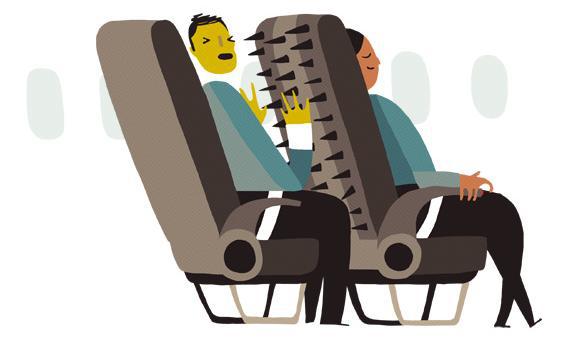“The Recline and Fall of Western Civilization: Tilting your seat back on an airplane is pure evil. But so is installing seats that recline in the first place,” by Dan Kois. If you’re one of the many people who recline your seat when you fly coach, Kois makes an impassioned plea for you to stop immediately! He writes that while reclining seats made sense in the early days of air-flight, when roomier accommodations were the norm, this feature has outlived its usefulness.
“In Defense of Drones: They’re the worst form of war, except for all the others,” by William Saletan. Saletan defends drone attacks from their critics, explaining that while they may be problematic in other ways (such as militarization of the CIA and evasion of congressional restraint), American drones have killed civilians at a much lower rate than the aerial bombings that led to so many casualties in the wars of the 20th century.
“The Myth of the Movie Musical Renaissance: Why do people keep saying the genre is coming back?” by Aisha Harris. Everyt time there is a musical hit such as Chicago, Dreamgirls, or current Oscar nominee Les Misérables, predictions about the comeback of the movie musical abound—and wrongly so, argues Harris. These films appeal to our nostalgia, she writes, but the studio system which shaped the genre’s golden age is long dead, and the production of new musicals remains incredibly difficult.
“Alligators in Your Backyard: Thanks to climate change, the cold-blooded giants are lurching north,” by Jackson Landers. Most people associate alligators with Florida and the other Gulf states, but as Landers explains, the natural habitat of alligators extends as far north as the southern border of Virginia. As the climate warms, this range may extend even further, forcing the federal and state government to decide what to do as alligators claim more and more territory.
“After Scalia: Don’t give up on campaign finance reform, however hopeless it seems now,” by Richard L. Hasen. Hasen laments the state of the current campaign financing system following the landmark Citizens United case, the inaction of both the president and Congress in passing new reforms, and the paralysis of the FEC. He concludes that the best hope for change may be nothing less than a vacancy in the conservative faction of the Supreme Court during a future Democratic administration.
“Can Leprosy Finally Be Eradicated?: A new test and vaccine could stop a disease that has cursed humanity for millennia,” by Laura Fisher Kaiser. One of the World Health Organization’s “neglected tropical diseases,” leprosy is frustratingly infectious, hard to diagnose, and complicated to treat, with millions of people worldwide affected by the disease. A new test and a vaccine being developed by the Infectious Disease Research Institute could change this, but, as Kaiser reports, the ultimate eradication of this ancient malady still seems far off.
“Don’t Be a Bystander: How to teach kids to step in and stop bullies in their tracks,” by Emily Bazelon. Touching on the themes in her new book, Sticks and Stones, Bazelon discusses the crucial role bystanders play—or don’t play—in bullying. She writes that programs that reward other children’s willingness to step forward to stop cruelty could reduce childhood aggression.
“Are Oysters Doomed?: Don’t believe in climate change? Talk to a clam digger,” by Maria Dolan. At the turn of the last century, once-plentiful oyster harvests dwindled due to overfishing and water pollution. While those problems have largely been stemmed, oysters now face a new worldwide threat—ocean acidification due to increased carbon dioxide emissions. Dolan details the acidification problem and what it means for shellfish and other marine life.
“Beastly Justice: In the Middle Ages, animals that did bad things were tried in court. Maybe that’s not as crazy as it sounds,” by James McWilliams. McWilliams sheds light on the curious custom of putting animals on trial in medieval Europe. By ascribing moral agency to goats and pigs, our forebears recognized the dignity and intelligence of animals in a way that modern humans, with our feedlots and industrialized farms, do not.
“The End of Cheap Airfare: The US Airways/American merger will mean fewer flights, higher prices, and worse service. But that’s OK,” by Matthew Yglesias. Last week’s merger of American Airlines and US Airways marks the latest in a series of airline mergers designed to cut both competition and service, explains Yglesias. The more expensive airfares may be a bad deal for consumers, he argues, but this trend may also be the only way to restore the airline industry to profitability.
